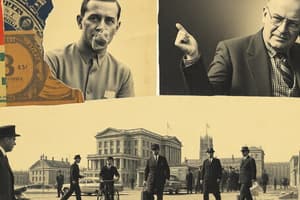Podcast
Questions and Answers
What did Mussolini's agreement with the Pope in 1929 signify?
What did Mussolini's agreement with the Pope in 1929 signify?
It ended a 50-year conflict between the Italian state and the Vatican.
What historical events marked the period from 1929 to 1933?
What historical events marked the period from 1929 to 1933?
The Wall Street Crash, the Great Depression, the rise of Mussolini, and the arrival of Hitler.
What was the aim of Gandhi's Salt March in 1930?
What was the aim of Gandhi's Salt March in 1930?
To challenge British rule in India.
How did Hitler's Nazi party gain significant support in the 1930 election in Germany?
How did Hitler's Nazi party gain significant support in the 1930 election in Germany?
Why did King Alfonso the 13th go into exile after the 1930 elections in Spain?
Why did King Alfonso the 13th go into exile after the 1930 elections in Spain?
Who was the editor of a left-wing newspaper in 1931 and was later arrested due to conservative opposition?
Who was the editor of a left-wing newspaper in 1931 and was later arrested due to conservative opposition?
Which country faced economic challenges in 1931 after returning to the gold standard, leading to financial crisis and rising unemployment?
Which country faced economic challenges in 1931 after returning to the gold standard, leading to financial crisis and rising unemployment?
Who emerged as a prominent figure in Japan in 1932 as the country increased military spending and left the League of Nations?
Who emerged as a prominent figure in Japan in 1932 as the country increased military spending and left the League of Nations?
Who supported Adolf Hitler's rise to power in Germany through propaganda efforts and a coalition of discontented voters?
Who supported Adolf Hitler's rise to power in Germany through propaganda efforts and a coalition of discontented voters?
Who implemented drastic measures to address the Great Depression in the US, including a banking holiday and subsequent legislation?
Who implemented drastic measures to address the Great Depression in the US, including a banking holiday and subsequent legislation?
Flashcards are hidden until you start studying
Study Notes
- The channel is part of the History Hit Network, focusing on turning points in history caused by human actions rather than natural disasters.
- People with power, ambition, and belief shape historical events, making individuals the authors of history.
- The period from 1929 to 1933 marked significant historical events like the Wall Street Crash, the Great Depression, the rise of Mussolini, and the arrival of Hitler.
- In 1929, Mussolini signed an agreement with the Pope, ending a 50-year conflict between the Italian state and the Vatican.
- Germany, under Chancellor Gustav Stresemann, was described as dancing on a volcano economically before the stock market collapse.
- Stalin's leadership in the Soviet Union saw significant industrialization and central planning, with a drastic increase in tanks from 90 to 4,700 in four years.
- Gandhi's Salt March in 1930 aimed to challenge British rule in India, using media coverage to gain popular support.
- Churchill dismissed Indian nationalism and viewed movements for independence as a threat to civilization.
- Stalin's restructuring of Soviet society led to rural violence and coercion during the collectivization process.
- Hitler's Nazi party gained significant support in the 1930 election in Germany by appealing to national unity and stability.- After elections, King Alfonso the 13th went into exile due to a victory for Republican parties in Spain.
- Dolores Ibarruri became the editor of a left-wing newspaper in 1931 and was arrested as conservative opposition grew stronger.
- There were debates about using the army to prevent the separation of church and state, with key generals opposing extreme measures like civil war.
- Franco, initially supporting the monarchy, turned against Alfonso the 13th, leading to his exile.
- Hitler's niece was found shot in 1931, causing a scandal that he denied, and he later began a relationship with a younger woman.
- The Japanese military invaded Manchuria in 1931, defying their civilian government's orders and significantly expanding their empire.
- In 1931, Britain faced economic challenges after returning to the gold standard, leading to financial crisis and rising unemployment.
- Mahatma Gandhi gained global fame for his non-violent activism, attending conferences and advocating for peaceful solutions.
- In 1932, Hideki Tojo emerged as a prominent figure in Japan as the country increased military spending and left the League of Nations.
- Adolf Hitler's rise to power in Germany involved significant support from Joseph Goebbels' propaganda efforts and a coalition of discontented voters.
- Mussolini in Italy promoted fascism as a dynamic form of activism, aiming to elevate Italian grandeur through his policies.
- Stalin's collectivization efforts in the Soviet Union led to struggles with defining and targeting kulaks, wealthy peasants facing persecution.
- In 1933, Hitler and Roosevelt came to power in Germany and the US respectively, with Roosevelt implementing drastic measures to address the Great Depression.
- Roosevelt's banking holiday and subsequent legislation during the first 100 days of his presidency helped restore confidence in the US economy.
- Roosevelt's radio broadcasts, the Fireside Chats, were instrumental in communicating with and rallying the American public during the crisis.- FDR prioritized fixing the national economy over international arrangements during an economic conference.
- John Maynard Keynes supported FDR's decision, highlighting the risk of Nazism, Fascism, and Japanese militarism without joint action.
- The World Economic Conference failed due to the inability of the major Democratic Powers to reach an economic deal.
- Hitler's rise to power in Germany involved human errors, including Hindenburg and his circle underestimating Hitler's intentions.
- Hitler became Chancellor of Germany in January 1933 through a small conservative elite conspiracy.
- The Reichstag fire in February 1933 led to an emergency decree that abrogated civil liberties across Germany, consolidating Hitler's power.
- The enabling act in March 1933 granted Hitler dictatorial powers, leading to the establishment of the Reich Chamber of Culture and concentration camps.
- Hitler's regime began targeting Socialist and Communist leaders, arresting them and setting up the first concentration camp in Dachau.
- In 1933, Hitler gained confidence through elections and cracked down on opposition, while the Soviet Union faced the devastating Ukraine famine.
- Hitler initiated a one-day boycott of Jewish shops in April 1933, signaling the beginning of anti-Semitic policies.
Studying That Suits You
Use AI to generate personalized quizzes and flashcards to suit your learning preferences.




